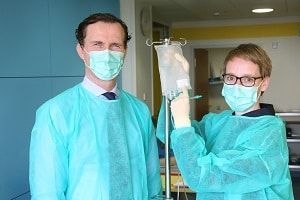Cancer immunotherapy – We make the immune system sharp against cancer

New approach in cancer immunotherapy
Under the leadership of the University Hospital Regensburg (UKR), the first clinical trial in Germany on a new approach in cancer immunotherapy is starting. In certain leukaemia and lymphoma diseases, Medigene AG’s new T-cell receptor therapy can decisively support the patient’s immune system in the fight against cancer, the scientists hope.
For leukemia and lymphoma patients, allogeneic stem cell transplantation, in which the patient receives a new immune system through stem cells from a donor, is both a blessing and a curse. Although a stem cell transplant is often the only cure, it is associated with the risk of life-threatening side effects.
But there are new alternative approaches in the fight against blood cancer: Doctors and scientists from the university hospitals of Regensburg, Erlangen and Würzburg, under the leadership of the UKR, are currently investigating in Medigene AG’s first nationwide clinical trial whether certain white blood cells (T cells) of leukemia or lymphoma patients can be modified in such a way that they destroy cancer cells.
“In T-cell receptor therapy, the patient’s own immune system is made sharp against cancer cells. We assume that this therapy could be more gentle and less risky for the patients than an allogeneic stem cell transplantation,” summarizes PD Dr. Simone Thomas, head of the clinical trial “CD-TCR-001” and senior physician at the Clinic and Polyclinic for Internal Medicine III of the UKR, summarizes the research goal of the new cancer immunotherapy.
© UKR/Klaus Völcker
Cancer immunotherapy – New T-cell receptor identifies cancer cells to destroy them
T cells play a crucial role in the fight against leukemia. They can kill cancer cells when their receptors (so-called. T-cell receptors) recognize very specific protein structures (antigens) on the cancer cells. However, there are no or only a few T cells with these special receptors in the patient’s body. “In the CD-TCR-001 study, we are therefore equipping the patient’s T cells with a very specific T cell receptor.
With their help, the T cells can identify and destroy cancer cells that the patient’s own immune system would otherwise not have recognized. This is the first controlled clinical trial with a T-cell receptor in Germany,” Professor Dr. Wolfgang Herr, director of the Clinic and Polyclinic for Internal Medicine III of the UKR, the high relevance of the study. Until now, chemotherapy and stem cell transplantation have been the main forms of treatment in leukemia therapy.
Cancer immunotherapy – New therapy could be gentler on patients
To carry out the T cell receptor therapy, the doctors and scientists isolate white blood cells, so-called T cells, from the blood of the leukemia and lymphoma patients. These T cells are equipped with a T cell receptor in a cell culture procedure, which recognizes the antigen “PRAME” on the cancer cells. This new therapy was developed by the biotechnology company Medigene.
The patients then receive the modified T cells back as a blood transfusion. “These T cells are exclusively designed to destroy cancer cells with the antigen PRAME. Healthy tissue should not be attacked,” explains PD Dr. Simone Thomas, who played a major role in developing the study protocol. This “cancer specificity” represents a decisive advantage compared to allogeneic stem cell transplantation.
This is because the desired reaction, in which the donor’s T cells are directed against the remaining cancer cells, is often accompanied by an undesired and sometimes life-threatening reaction of the immune system, in which the donor’s T cells are also directed against the recipient’s healthy tissue cells.
Study divided into two phases
In the currently starting phase I clinical trial of T-cell receptor therapy, scientists are testing the new therapy (MDG1011) in up to twelve patients for safety, feasibility and initial indications of efficacy. If the results of the Phase I part are positive, 40 additional patients will be treated with the T-cell preparation MDG1011. In this second phase of the study, the scientists will primarily determine the effectiveness of the therapy.
Patients with acute myeloid leukemia (AML), myelodysplastic syndrome (MDS) or multiple myeloma (MM), for whom chemotherapy is no longer effective or who have suffered a relapse of their disease, can be treated in the study. The study is financed and commissioned by the German biotechnology company Medigene AG, based in Martinsried, Germany. The necessary approvals from the Paul Ehrlich Institute and the relevant ethics committees to conduct the study have already been granted.
Cutting edge in medicine. Human in the encounter.
As the youngest university hospital in Germany, the University Hospital Regensburg (UKR) provides about 35.000 inpatients as well as ca. 142.000 outpatients. For this purpose, the UKR has 839 beds and 52 day-clinic treatment places available (out of a total of 1.087 university-operated beds of the Faculty of Medicine at the University of Regensburg). In 28 human and dental clinics, polyclinics, institutes and departments, the University Hospital Regensburg employs more than 4.600 employees.
The University Hospital Regensburg is oriented toward high-performance medicine, especially in the fields of transplantation and intensive care medicine as well as oncological and cardiovascular diseases. In terms of average case severity (“case mix index”), the UKR is at the top of German university hospitals. In addition to providing the highest level of patient care, the UKR, together with the Faculty of Medicine at the University of Regensburg, is responsible for the training of approximately 2.000 students (human medicine and dentistry) and for medical research. The common goal of all employees is the optimal medical and nursing care of the patients as well as an appreciative cooperation in the team.
Contact
University Hospital Regensburg
Franz-Josef-Strauß-Allee 11
93053 Regensburg




